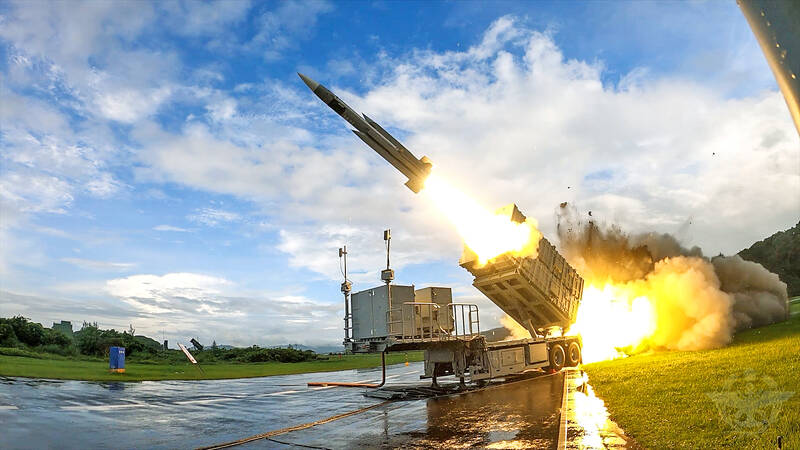The military’s top research body yesterday denied any data breach after the Chinese-language Mirror Media Weekly magazine reported that equipment used to calibrate the military’s domestically developed supersonic missile system was found to have been repaired in China.
The National Chungshan Institute of Science and Technology said in a news release that it had sent a theodolite, which it bought in 2021 for use in Hsiung Feng III supersonic missile systems, back to the manufacturer in Switzerland for maintenance after finding it was faulty.
After the repaired theodolite was sent back, the institute found out that the equipment had been sent back to Taiwan from the China’s Shandong Province instead of from Switzerland, it said.

Photo courtesy of the Ministry of National Defense
Asked about the origin of the repaired theodolite, the manufacturer told the institute that it operates a maintenance center in Shandong, at which it conducted the repair, the institute said.
The magazine said that the institute sent two theodolites for repair in Switzerland, one in December 2021 and one in February last year.
The institute’s news release did not specify how many theodolites it had sent to the manufacturer and when it received them back.
The institute said it ran a full-scale information security check on the equipment to ensure that no malware had been installed while it was repaired in China.
This cleared all security concerns, it said.
MEASURES PLANNED
The institute also said that it was discussing measures to ensure that similarly sensitive equipment would not be sent to China for maintenance, citing national security reasons.
A theodolite is a precision optical instrument for measuring angles in specialized applications such as rocket launches.
The institute said that the theodolite it sent to Switzerland is used for launching Hsiung Feng III missiles.
The Hsiung Feng III, the most modern in Taiwan’s Hsiung Feng missile family, is a supersonic anti-ship cruise missile. It was first test-fired in 1997, with further tests conducted in November 2004.
The navy reportedly finished the initial operational test and evaluation in 2005, with the missile system first put on public display in the Double Ten National Day parade in Taipei in 2007.
The missile is believed to have an operating range of 400km with a possible maximum range of more than 1,500km.

Chinese spouse and influencer Guan Guan’s (關關) residency permit has been revoked for repeatedly posting pro-China videos that threaten national security, the National Immigration Agency confirmed today. Guan Guan has said many controversial statements in her videos posted to Douyin (抖音), including “the red flag will soon be painted all over Taiwan” and “Taiwan is an inseparable part of China,” and expressing hope for expedited reunification. The agency last year received multiple reports alleging that Guan Guan had advocated for armed reunification. After verifying the reports, the agency last month issued a notice requiring her to appear and explain her actions. Guan

GIVE AND TAKE: Blood demand continues to rise each year, while fewer young donors are available due to the nation’s falling birthrate, a doctor said Blood donors can redeem points earned from donations to obtain limited edition Formosan black bear travel mugs, the Kaohsiung Blood Center said yesterday, as it announced a goal of stocking 20,000 units of blood prior to the Lunar New Year. The last month of the lunar year is National Blood Donation Month, when local centers seek to stockpile blood for use during the Lunar New Year holiday. The blood demand in southern Taiwan — including Tainan and Kaohsiung, as well as Chiayi, Pingtung, Penghu and Taitung counties — is about 2,000 units per day, the center said. The donation campaign aims to boost

The Kaohsiung Tourism Bureau audited six hotels in an effort to prevent price gouging ahead of Korean band BTS’ concert tour in the city scheduled for Nov. 19, 21 and 22 this year. The bureau on Friday said that the audits — conducted in response to allegations of unfair pricing posted on social media — found no wrongdoing. These establishments included the local branches of Chateau de Chine, Hotel Nikko, My Humble House, and Grand Hai Lai, it said, adding that the Consumer Protection Commission would have penalized price gougers had the accusations been substantiated. The bureau said the Tourism Development Act

BACK TO WINTER: A strong continental cold air mass would move south on Tuesday next week, bringing colder temperatures to northern and central Taiwan A tropical depression east of the Philippines could soon be upgraded to be the first tropical storm of this year, the Central Weather Administration (CWA) said yesterday, adding that the next cold air mass is forecast to arrive on Monday next week. CWA forecaster Cheng Jie-ren (鄭傑仁) said the first tropical depression of this year is over waters east of the Philippines, about 1,867km southeast of Oluanpi (鵝鑾鼻), and could strengthen into Tropical Storm Nokaen by early today. The system is moving slowly from northwest to north, and is expected to remain east of the Philippines with little chance of affecting Taiwan,